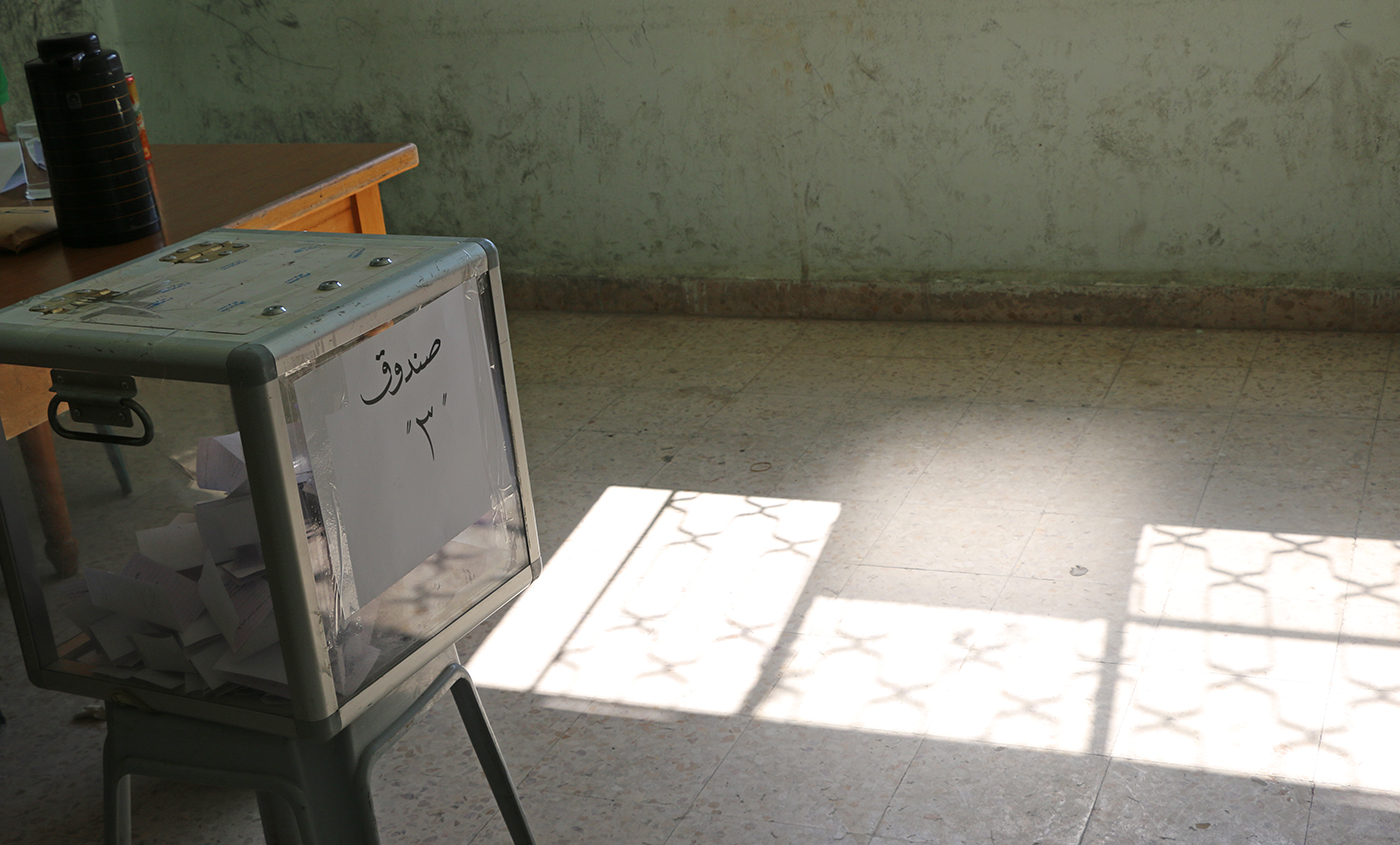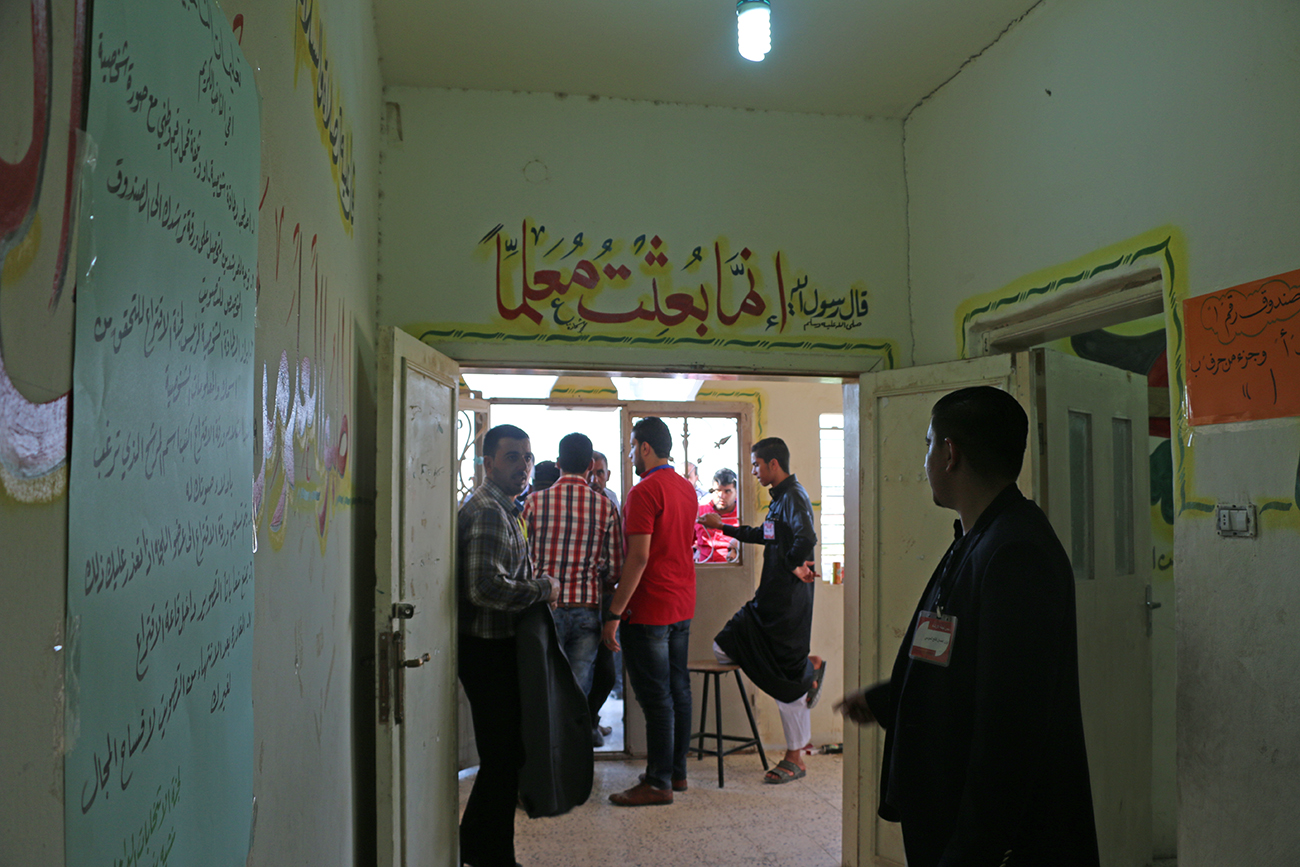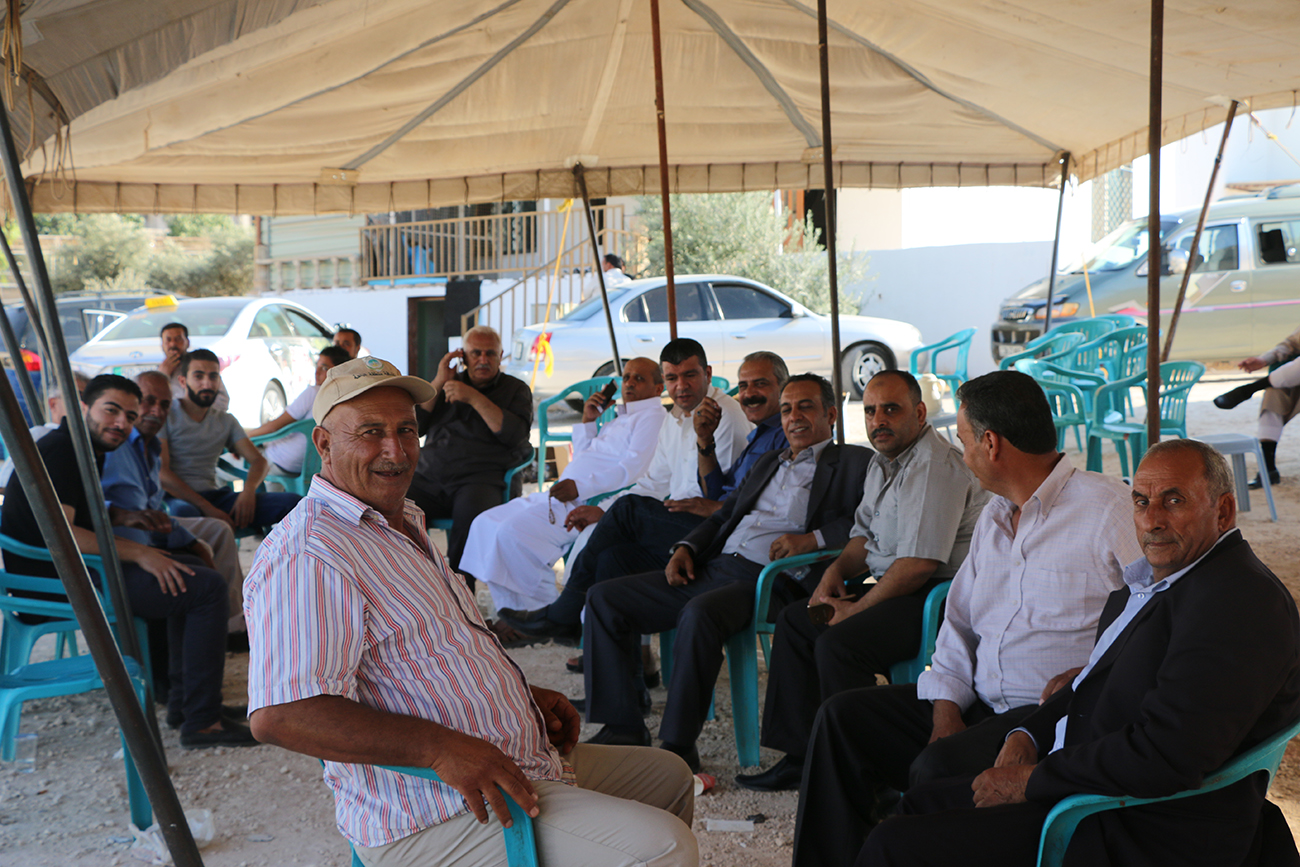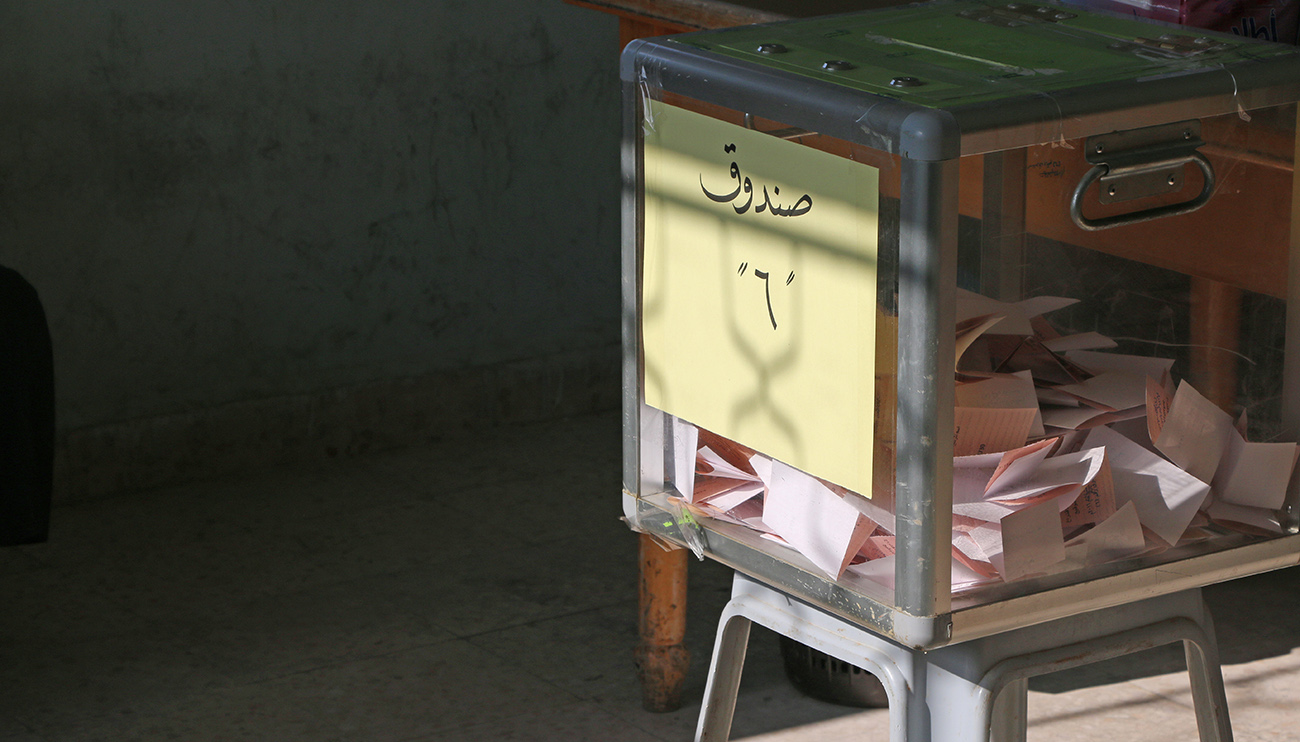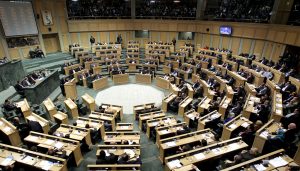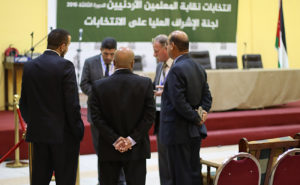Translated by Michelle Balon
This article was published on 7iber.com in Arabic on August 23rd, 2016
All you need to be able to participate in the internal elections for selecting your tribe’s consensus candidate is an ID card confirming that you’re a male over 17 years old, and that your last name matches that of the tribe, which is gathered to elect its representative in the parliamentary elections.
Not far from the Mafraq city center, in the town of Mansheyat Bani Hasan, about 2,000 male members of the Al-Shadaifat tribe gathered late last month to elect their candidate for the upcoming parliamentary elections. The process was guided by protocols and guidelines as determined by the tribe’s Central Elections Committee. Some of its provisions were taken from the Independent Election Commission’s (IEC) guidelines, others from one of the tribe’s internal documents, and several from customs and norms not formally stipulated anywhere.
The process of selecting a consensus candidate is not reserved to one particular tribe. It is a mechanism used by many tribes in the months preceding the announcement of the official candidates in parliamentary elections.
Tribe members either agree on their election candidate, or – in the event of numerous people expressing their interest to run – hold internal elections in accordance with the organisational processes determined by each individual tribe.
While women are usually absent from the consensus meeting and internal elections held in each tribe’s districts, they are asked to vote in the parliamentary elections for the candidate agreed upon by the men, by virtue of the pledge given by male members of the tribe to the internal elections and consequently to the winner of the tribal consensus.
Human rights advocates and activists criticise these elections for being anti-constitutional and encroaching upon the freedom of individuals to run. But others see consensus as a way for a group of people to agree on a person to represent them in the elections. As long as it’s done through elections and not compulsion, they consider it to be a democratic mechanism.
Inside the building designated by the Al-Shadaifat tribe as the polling station for its internal elections in Mansheyat Bani Hassan. Photo by Dana Gibreel.
Why agree on a candidate?
Former Minister of Transport Mohannad al-Qudah believes the tribal establishment plays a role in the absence of political parties, weakness of civil society organisations, and lack of political and social programs. “The internal elections transform the tribe into a political establishment. Each tribe tries to secure representation in Parliament, which will work to protect the tribe’s narrow interests. The matter is in no way related to political programs,” said al-Qudah, who himself participated in the internal elections of the al-Qudah tribe in Ajloun.
According to Eid Dhaher al-Shadaifat, Head of the Central Committee that oversees the al-Shadaifat tribe’s internal elections, a tribe without a consensus candidate has no chance of securing representation in Parliament. “This [the consensus candidate] has guaranteed the al-Shadaifat tribe parliamentary representation over the past four cycles,” said al-Shadaifat.
The “Parliamentary Elections Without Tribalism” campaign aims to encourage youth to vote based on programs and qualifications, not tribal consensus. “During this cycle, many of the initiative’s young people refused to participate in the tribal consensus or internal elections. They declared that the consensus candidates didn’t represent them due to the large age gap between the youth and the candidate, and also due to the absence of electoral programs,” said Islam al-Btoush, General Coordinator of the Initiative. Given the number of people that reach out to them, al-Btoush knows that while many young people support their initiative, those willing to declare their support is limited, out of “fear and sensitivity to the issue.”
“Many of the young people in the initiative would rather boycott the elections than vote for a candidate they don’t believe in,” said al-Btoush. He finds that the consensus candidate often stifles the free will of young voters, who are often coerced, and feel the weight of family tensions, which pressure them into voting for the consensus candidate.
Lawyer and Human Rights Activist Kamal al-Mashriqi confirms that tribal consensus violates both the constitution and national election legislation and standards: “The constitution states that the elections shall be direct and public. Tribal consensus clearly violates the constitution by denying individuals the right to run in the elections out of tribal obligation. It also prevents others from participating in the election process.”
Dr. Amer Bani Amer, Director of the Al Hayat Center for Civil Society Development, believes that when it comes to tribal consensus, it is the basis in kinship as opposed to political thought and affiliation, which “excludes skilled and qualified individuals, who otherwise may have had a chance in the elections.”
Researcher and Journalist Ahmed Abu Khalil ascribes the motivations behind the tribal preference for internal elections and consensus to the previous ‘One-Vote Elections Law’, which pushed voters to search for a way to get their candidate into Parliament through narrow channels. He adds that, “Tribes, themselves, are not to blame. They searched for the most logical way to deal with the law.”
Abu Khalil links the emergence of the tribal election “phenomenon” to the old ‘One-Vote’ laws. Beginning with the 1993 elections, this trend has simply continued until today. “People still remember the ‘One-Vote’ law. Even though it has been amended, they prefer to vote for a tribal candidate from within each slate instead voting for the slate itself,” explained Abu Khalil.
Former Parliamentarian Jamil al-Nimri justifies seeking his tribe’s support by the electoral reality. This reality “mandates” going through the tribe, given its status as “the main societal entity in electoral mobilisation. If you don’t go through it, you can’t compete in the elections.”
Inside one of the polling rooms in the al-Shadaifat tribe’s elections. Photo by Dana Gibreel.
In a conversation with 7iber, a number of al-Shadaifat members, seated in a tent erected in front of the Mansheyat Bani Hasan club where their internal elections were held, expressed their support for the principle of the consensus candidate. Voter, Abdallah al-Shadaifat, said that the internal elections are a democratic way to select a candidate for Parliament, adding: “we use all of our strength to serve our candidate.”
Yet a number of human rights advocates oppose labeling consensus as democratic. According to Bani Amer they see it as “based on integrally undemocratic foundations, like its ban on the participation of some of the tribe’s constituent members.”
On the other hand, Abu Khalil believes that internal elections are a way for groups and individuals to organise themselves and voice their opinions, whether as a tribe, a party, or a union. He equates them with any other meeting by which a constituency selects an individual to represent it in Parliament, asking, “what is the difference between businessmen gathering and determining who will represent them, and a tribe doing the same?”
Meanwhile, al-Nimri blames tribal consensus for transforming legislative representatives into service representatives who work only to meet the demands of their supporters. Abu Khalil holds this responsible for the state of the country’s policies and directions. “Over the past few years, the state has encouraged the establishment of a ‘House of Services’. It has even guided the transformation of anyone with a clear program or vision for the country into a service representative. It is thus the institution of the state that is demanding service or programmatic representatives, not the tribes,” said Abu Khalil.
In the same context, Abu Khalil believes that political parties are on their way to becoming service-based. He says, “The parties, for example, present candidates that espouse particular party policies. But in reality, they don’t work in accordance with these policies. The difference is that the political parties lie, while the tribes are honest and transparent.”
Does being outside the consensus mean being outside the tribe?
Reports issued by the RASED Coalition for Electoral Monitoring reveal that many tribal consensuses were violated during the nomination and slate registration processes for the upcoming September 20 elections. “We recorded a number of cases in which the consensus candidates in various tribal lists were not voted for,” said Amer Bani Amer, Director of the Coalition.
A number of tribal election supervisors confirmed to 7iber that despite the pledges made by tribes to their members, the tribal consensus was “abandoned” in many of the previous elections, and a different person nominated. In such cases, the person outside of the consensus is excluded and boycotted for being a “saboteur, and failing to respect the pledge.”
“The tribal establishment shows no mercy to people who violate the consensus or majority,” said al-Qudah, clarifying that anyone running outside of the tribal consensus usually receives very few votes. “It happened in the al-Qudah tribe during one of the election cycles. The candidate barely got 100 votes, but put himself in an embarrassing and ostracising social position,” he added.
In terms of the legality of the internal elections, IEC Spokesperson Jihad al-Momani stated that they are “void and illegal,” adding that the IEC neither “interferes with, adopts, nor takes into consideration” the internal tribal elections.
The exclusion of anyone outside of the tribal consensus is “internal tribal logic, in which the IEC does not interfere. Legally, the IEC welcomes and accepts the candidacy of any nominees,” said al-Momani.
Bani Amer confirmed that the observations of the RASED Coalition for Electoral Monitoring indicate that tribal consensuses have decreased since the 2013 elections. He attributes this decrease to two main factors: the new Elections Law, which widened the electoral circuits, and the principle of the open proportional slate. Given the limited scope of the influence of the consensus, Bani Amer believes that this phenomenon is on its way out.
Women are “exempt” from the trouble of participating
Despite the precision with which the al-Shadaifat tribe organised its elections, the Organizing Committee did not allow women to participate in the voting, under pretenses of their comfort and convenience, as well as their need for a different type of effort and organisation.
“We relieved the women, who have different concerns than men. They are homemakers and caretakers, with many concerns at home. We wanted to relieve them and have the men play this role… The process requires great reserve, effort, and cost. We’re ready to have women vote in the general elections, but the tribal consensus candidate should be chosen by the tribe,” said Committee Head Sheikh Eid al-Shadaifat, explaining the reasons for excluding women from voting.
A group of men from the al-Shadaifat tribe in the tent in which the internal elections were held, in front of the Mansheyat Bani Hassan Club. Photo by Dana Gibreel.
Tufaha al-Shadaifat, Dean of the al-Dejniyah Secondary School in Mafraq claims that, while these excuses may be “valid,” they shouldn’t be used to deny women – who make up half of the tribe – the right to participate in the internal elections.
“Just as women exercise their rights on the formal election day [parliamentary elections], so should they be able to vote in the internal elections. They could be allocated a separate day, or vote in a different school,” said al-Shadaifat.
According to Zaid Abu Ja’far, the same goes for consensus in the Beer Saba’a tribes in Balqa, where women do not attend the tribe’s internal elections. “The man attends the consensus meeting and represents his family. When he goes home, he tells his wife who to vote for, and she goes ahead and votes on that basis, for her husband’s sake,” he said.
Not far from the polling station used in the al-Shadaifat elections, Hana’ Abdallah sits at the door of her home. She knows that her tribe’s elections are happening nearby, but shows no interest in participating. “The elections are only for the men, we don’t get involved. I don’t get involved in the tribe’s elections because they’re filled with problems and a lot of fights break out. If you do want to vote for someone, they tell you that you can’t vote for them,” she said.
But Hana’ still expresses her excitement about the parliamentary elections, in which she participates when her relatives call on her to do so, explaining that, “When they come and ask me to vote for someone, I don’t mind voting for them. But if no one asks me, then I can’t go. I like voting.”
Other tribes like al-Nimri and al-Wishah have allowed women to attend the consensus meetings convened by the tribe.
Jamil al-Nimri shared the story of his tribe’s “first experience” with having women attend the meeting: “Due to the spread of al-Nimri to several districts, we convened a number of meetings in which women requested to participate. They were allowed to participate in Amman and Zarqa, but then the women in the areas known to be more conservative protested, demanding that they too be allowed to participate.”
As for the al-Wishah tribe, its consensus candidate convened a consensus meeting for the men in order to announce his intention to run. Over the course of ten days, he received the consensus of the men, after which he convened another meeting, this time for women. According to Dr. Abla Wishah, approximately 600 women attended that meeting.
The female presence came as a surprise, revealed al-Wishah, adding that, “the number of registered voters in the Wishah tribe is 1,200, which means that the female attendees constituted half of the voters. This shows that they have a desire to be present and to participate.”
Abu Khalil’s experience monitoring tribal consensus during the previous electoral cycle is filled with examples of tribes who allowed women to vote internally. Some of them ended up with a female consensus candidate. “Representative Nariman al-Rousan was a consensus candidate elected by her tribe. And while there are examples from other tribes as well, we can’t storm many of the tribes with questions that may be beyond them, questions that may be beyond the scope of their tribal and villager mentality,” he explained.
On the other hand, the desire of some women to vote outside of the tribal consensus may have consequences. Tufaha al-Shadaifat said that she knows a number of teachers whose husbands threatened to divorce them if they refused to vote for a particular candidate. She said, “Some of their husbands swore they’d divorce them if they didn’t vote for a particular person. One of the teachers told me she had to take an oath on the Qur’an in front of ten men, swearing that she had voted for the consensus candidate in the previous election.”
How are the internal elections run?
The election mechanisms differ among the tribes, and are usually in accordance with the tribes’ different guidelines and viewpoints.
The al-Shadaifat tribe espouses very strict organisational mechanisms that come from one of the tribe’s internal documents, stipulating the principle of cyclical nomination. Due to the fact that al-Shadaifat tribe members in Mansheyat Bani Hasan are divided into the Western and Eastern neighbourhoods, nomination alternates between them each cycle.
The Committee took all necessary measures prior to holding elections, indicated Yazan al-Shadaifat, member of the Supervisory Committee for the elections. They arranged everything from obtaining registered voter lists from the IEC, to registering for the internal elections – completed the day before voting day – and finally to the logistics of the process.
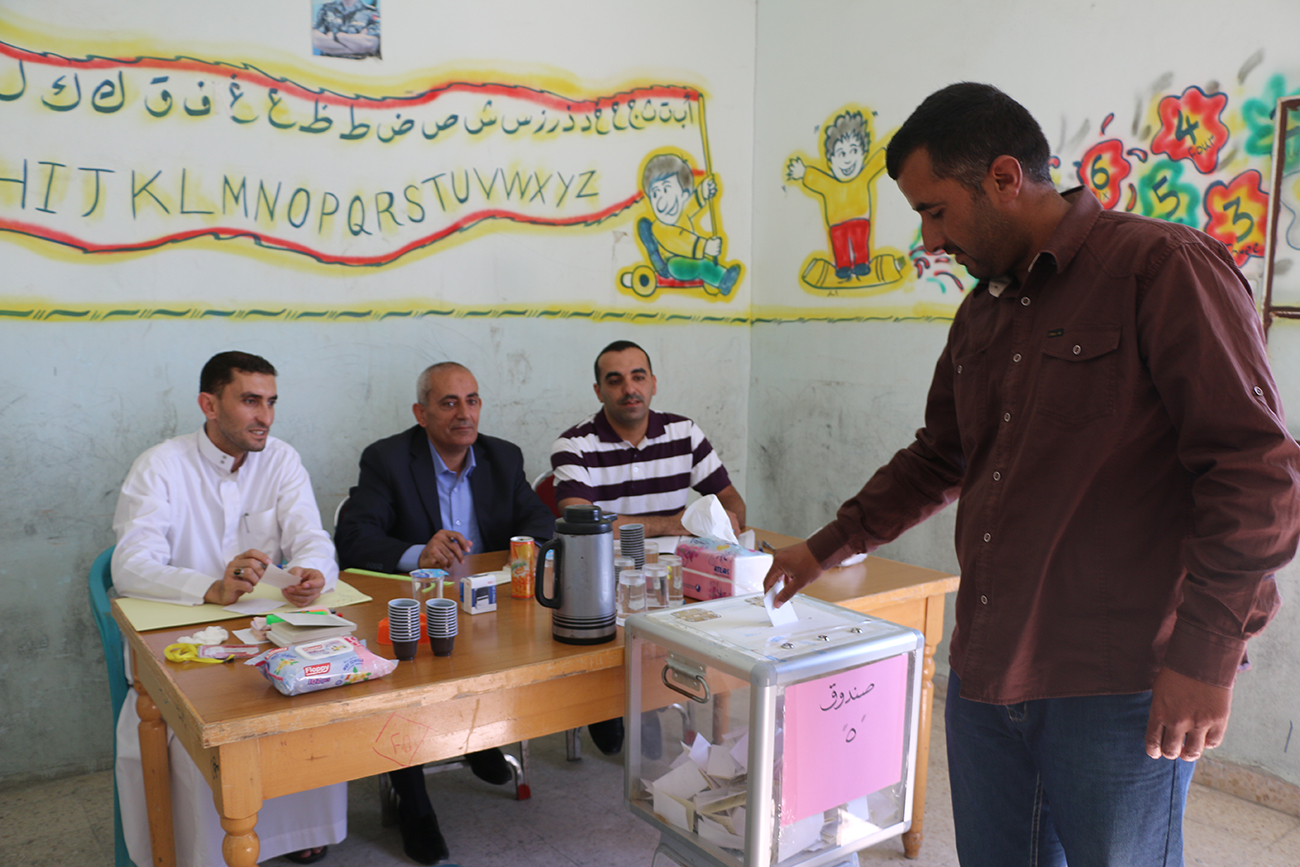
A member of the al-Shadaifat tribe casts his vote in the internal elections. Photo by Dana Gibreel.
One of the provisions decreed by the al-Shadaifat internal elections Central Committee is that each candidate must pay the Supervisory Committee 26,000 JOD. The latter deducts 1,000 JOD to organise the elections and provide food, and keeps the remaining 25,000 JOD until the internal elections are done and the results announced. While the winner gets their money back, the Committee keeps the loser’s money to guarantee adherence to the consensus candidate and their nomination for the parliamentary elections. If the nomination period for the elections finishes and the loser is not nominated, they then get their money back. If the loser is nominated, the money is donated to charity and spent on those in need, explained Sheikh Eid al-Shadaifat.
The al-Qudah tribe’s systems stipulate that each candidate must pay a non-refundable sum of 2,500 JOD to cover the costs of the voting process, including food, hospitality, papers, printing, and stamps. The remaining money goes to the needs of the place of accommodation that was commissioned to host the elections.
The voting process is preceded by the swearing of an oath, whereby each candidate swears to uphold the consensus and pledges to support the candidate that wins the internal elections.
The al-Wishah tribe saw no need to hold elections. It instead agreed on the one person who expressed his desire to run in the parliamentary elections. The sole candidate sufficed with convening a meeting to declare his desire to run, ask the tribe if it had any hesitations, then request its support, explained Dr. Abla al-Wishah. The former Representative Jamil al-Nimri received his tribe’s support through the same mechanism.
If women begin participating in selecting the consensus candidate, would the internal elections become a democratic process? According to Amer Bani Amer, the problem lies in the principle of selection based on blood relations instead of on thought and ideology. If women were to participate, “the matter may become more acceptable, but it wouldn’t solve the dilemma,” replied Amer. In Tufaha al-Shadaifat’s opinion, the solution lies in amending the tribe’s internal document to allow women to vote and run in the internal elections.
While civil society organisations demand increased female representation under the parliamentary umbrella, through either quota or competition, many see women as nothing more than an “influential” number in the parliamentary elections that can help them fulfill their tribal pledges. They “grant” women the right of political participation in the parliamentary elections, and may even facilitate their movement and transport to the polling station, in order for them to elect the candidate that was chosen in their absence.
